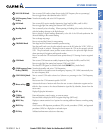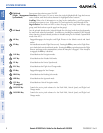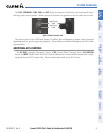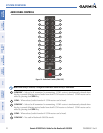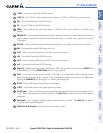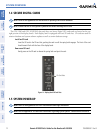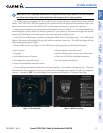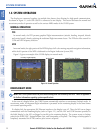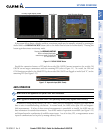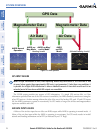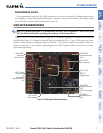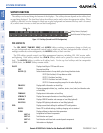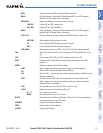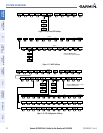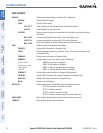
190-00595-01 Rev. B
Garmin G1000 Pilot’s Guide for the Beechcraft A36/G36
15
SYSTEM OVERVIEW
SYSTEM
OVERVIEW
FLIGHT
INSTRUMENTS
EIS
AUDIO PANEL
& cNS
FLIGHT
MANAGEMENT
HAZARD
AVOIDANCE
AFCS
ADDITIONAL
FEATURES
APPENDICES INDEX
Figure 1-10 Reversionary Mode Operation
Audio Panel
Primary Flight Display Failed
Multi Function Display
If the system fails to detect a display problem, reversionary mode may be manually activated by pressing the
Audio Panel’s red
DISPLAY BACKUP
button (refer to the Audio Panel section for further details). Pressing this
button again deactivates reversionary mode.
Figure 1-11 DISPLAY BACKUP Button
Pressing the DISPLAY BACKUP
button activates/deactivates
reversionary mode for both the
PFD and the MFD.
Should the connection between a PFD and the on-side GIA 63/63W become inoperative, the on-side GIA
63/63W can no longer communicate with the remaining PFD (refer to Figure 1-1). As a result, the NAV and
COM functions provided to the failed PFD by the on-side GIA 63/63W are flagged as invalid (red “X”) on the
remaining PFD (see Figure 1-12).
Figure 1-12 Inoperative Input (NAV1 Shown)
AHRS OPERATION
NOTE: Refer to the Appendices for specific AHRS alert information.
NOTE: Aggressive maneuvering while AHRS is not operating normally may degrade AHRS accuracy.
In addition to using internal sensors, the GRS 77 AHRS uses GPS information, magnetic field data and air
data to assist in attitude/heading calculations. In normal mode, the AHRS relies upon GPS and magnetic
field measurements. If either of these external measurements is unavailable or invalid, the AHRS uses air
data information for attitude determination. Four AHRS modes of operation are available (see Figure 1-13)
and depend upon the combination of available sensor inputs. Loss of air data, GPS, or magnetometer sensor
inputs is communicated to the pilot by message advisory alerts.



